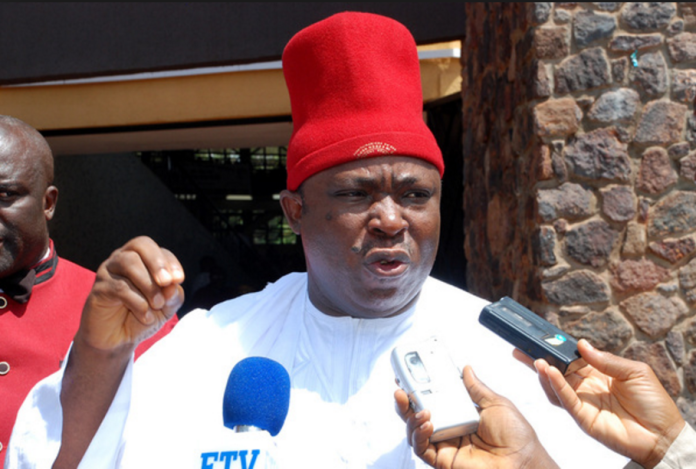By Okey Maduforo
At the height of the 1991/92 religious crisis in Kano, late Igbo Leader, Dim Chukwuemeka Odumegwu-Ojukwu, lamented the near absence of foot soldiers willing to take over the fight for Igbo cause, from him.
In a session with reporters, his reaction was sought on the killing of Ndigbo and Christians in the northern parts of the country.
Ojukwu’s reaction was emotional, depicting one itching for a worthy successor to take the baton of defending his people from him, having done so the greater part of his life.
“I have been running this relay race and at a point I looked around in search of who would take over the baton, I saw nobody”, Ikemba cried.
Apparently Ojukwu knew that at some point in his life, age would catch up with him and there would be the need for a younger leader to take over and continue the struggle for the actualization of the Igbo agenda.
APGA, MASSOB, come on board
Apparently in response to the clarion call, Chekwas Okorie, some years later, initiated moves to register a political party with bias on Igbo interest in the larger Nigerian nation.
That singular effort, heralded the birth of the All Progressive Grand Alliance (APGA).
Working from another flank, Ralph Uwazurike packaged the Movement for the Actualization of Sovereign State of Biafra (MASSOB), which he said, was aimed at validating the Biafran agenda that was halted in the 1967 – 1970 Civil War, where the East was overpowered by the Federal Troops, with support by international collaborators.
Though Ojukwu never supported a Biafran struggle similar to what he led between 1966 and 1970, he described Uwazurike’s project as the Biafra of the mind, insisting that wherever an Igbo man finds himself subsequently, he should stand tall and defend where he comes from.
Ojukwu however accepted the offer by Okorie to become the leader and symbol of APGA as the party to champion Igbo political emancipation.
On account of Ojukwu’s membership of the party, during the 2003 general elections, APGA became a critical mass within the South East geographical zone. Unconfirmed reports from observers, in fact, had it that APGA won in all the states of the South East.
Crisis in APGA
Curiously, since the heroic 2003 outing, APGA has not been able to reenact the feat. The fate of the party, at some point almost became uncertain, especially when Okorie, the founding National Chairman, was unceremoniously removed based on allegations of anti-party activities, particularly, his alleged liaison with the then Anambra State governor, Dr. Chris Ngige , whose election was being challenged by the party’s candidate, Peter Obi. Obi eventually won the case and was inaugurated governor, in 2006.
Even with the inauguration of Obi, the crisis in APGA did not abet. It rather lingered, particularly over who was the party’s authentic national chairman.
In the process, there was litany of litigations that involved Okorie and Victor Umeh and Maxi Okwu. Even Obi was caught in the web, as he variously supported Umeh and Okwu, at some points. Umeh, eventually had upper hand, following his endorsement by the Supreme Court, as the national chairman. It was under his leadership that Willie Obiano won his first term in office as Anambra governor.
Obiano inherits APGA crisis
The travails of APGA took a new twist, when shortly after the emergence of Obiano, his predecessor, Obi, who was then completing his second term, left the party under controversial circumstances. Till date, there are allegations and counter allegations on whether he was forced out of the party or that he left on his own.
Whatever informed his exit from APGA, Obi’s movement to the Peoples Democratic Party (PDP) elicited mixed reactions, with some, describing him as a man of fleeting loyalty who used late Odumegwu-Ojukwu to rise to fame, politically, through APGA only to dump him and the party, when it suited him.
While APGA tried to overcome its predicament with spirited efforts by Umeh, Obaino and Ojukwu’s widow, Bianca, the party was shocked when few days to the November 18, 2017 governorship election in Anambra, Ikemba’s son, Emeka Odumegwu Ojukwu Jr. walked out on it and publicly announced his membership of the All Progressive Congress (APC).
The exercise did not however affect the party’s outing at the poll, as Obiano was returned for a second term. In an acerbic reaction, National Chairman of APGA, Victor Oye described Emeka jr. as a prodigal son for abandoning a political party that his father groomed to prominence and remains its perpetual leader even at death.
Other stakeholders, also accused Ojukwu Jr. of playing the saboteur against the widely held Igbo political party.
Some, pointedly sniggered at him as having shot himself on the leg by his membership of the APC.
This line of logic gained ground with sympathizers of APGA, who are of the view that the APC is anti-Igbo and has nothing to offer to the people.
APGA, in whose interest?
While Anambra and APGA celebrate the victory of the party over November 18 poll in Anambra, political observers are of the view that it is still morning yet on creation day for APGA. There is particularly the concern that while APGA is seen as a party for the Igbo, it is more of Anambra affair.
It is noted, for instance, that Anambra members of the party, have dominated its leadership to the chagrin of other south east states. For example, between 2008 and 2014, Umeh was the National Chairman. At the expiration of his term, he handed over to Oye from the same Anambra Central Senatorial Zone of the State.
This was against insinuations that the likes of Edozie Njoku from Imo State, Captain Iheanacho, also of Imo and Dr. Alex Otti of Abia State, were allegedly edged out of the power play during the convention.
It is against this backdrop that observers argue that APGA is more of Anambra Progressives Grand Alliance (APGA), recalling that even the former Chairman Board of Trustees (BoT), Obi and the current (BoT) Chairman, Obiano are all form Anambra State. National Publicity Secretary of the party, Ifeatu Okoye, is also from the state.
To critics, the argument that Labaran Maku, from Nassarawa State, is the National Secretary, does not mean that the party has spread.
Those opposed to these observations however maintain that the party had a zoning formula for its convention, noting that no aspirant was shortchanged.
Danger not averted
The danger that the current arrangement portends, according to analysts, is that with time, the party may slip from its present one-state status and eventually fizzle out, if its impact is not being felt in other states, particularly in the south east.
There is also the allegation that apart from serving as platform for attaining political position, APGA is yet to evolve or advance any philosophy that truly presents it as serving Igbo interest.
On such issue as marginalisation which the south east has regularly accused successive administrations in the land of visiting it with, nothing much has been heard from the party as its template for remedying the situation.
Even in the current clamour by groups and individuals for restructuring the country on the part of good governance, APGA has not come up with a position paper that articulates and advances Igbo interest and position.
Instances as these, our reporter learnt, are issues that those leaving APGA usually cite in describing the party as lacking in focus and direction.













